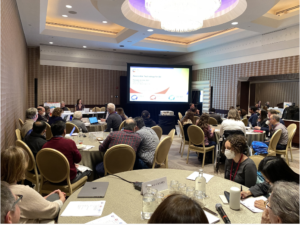This post was originally published by Helen Wright in the CRA-Industry Blog.
On February 22-23, 2023 in Washington, DC, the Computing Research Association (CRA) held the Accessible Technology for All Workshop.

CRA Accessible Technology for All Workshop Participants
The workshop was attended by over 40 participants from academia, industry, and government and 20 remote participants. The purpose of this workshop was to frame the state of the art of accessible technology, identify forces shaping the evolution of accessible technology, and develop an understanding of implications for the next wave of computer science research in accessibility. By the end of the workshop, important areas of future research were identified and the need for tech-informed policy were highlighted by the participants. A workshop report will be forthcoming.
The workshop began with a keynote address from Richard Ladner (University of Washington and Access Computing), a longtime advocate for accessible technology. Ladner emphasized the importance of designing technology with accessibility in mind from the beginning, rather than trying to retrofit it later. He also emphasized the opportunities and importance of more research into accessible technology, particularly in the area of machine learning. Ladner encouraged sociotechnical systems that leverage economic interdependencies to provide support for people with disabilities, as a complement to approaches that promote independence.
Other speakers at the workshop included representatives from major tech companies, researchers from universities, and advocates from American Association of People with Disabilities, American Foundation for the Blind, and Autistic Self Advocacy Network. They presented on a range of topics, including regulation, design processes, accessible educational technology, inclusive design, and emerging technologies like virtual and augmented reality.
The event concluded with a group discussion on the future of accessible technology research and innovation and big takeaways from the workshop. Participants identified several areas for future exploration, including the use of AI and machine learning to enhance accessibility, the development of new tools and platforms to support accessibility, and the importance of inclusive design practices. Throughout the workshop, participants emphasized the need for collaboration and communication across different sectors and disciplines in order to advance the field.
Overall, the CRA’s Accessible Technology for All Workshop provided a valuable forum for experts to share ideas and insights on the state of accessible technology and its future directions. By bringing together researchers, industry leaders, advocates, and government representatives, the workshop helped to catalyze new collaborations and initiatives to improve technology accessibility for all.
The workshop was co-hosted by CRA-Industry (CRA-I), Computing Community Consortium (CCC), and CRA-Widening Participation (CRA-WP) and led by a team of organizers from the various CRA committees including Jeanine Cooke (Sandia National Labs / CRA-WP), Shaun Kane (Google), Chris Ramming (VMware / CRA-I), Katie Siek (Indiana University / CCC), and Divesh Srivastava (AT&T / CRA-I).
Please stay tuned for the workshop report which will elaborate the major findings.









